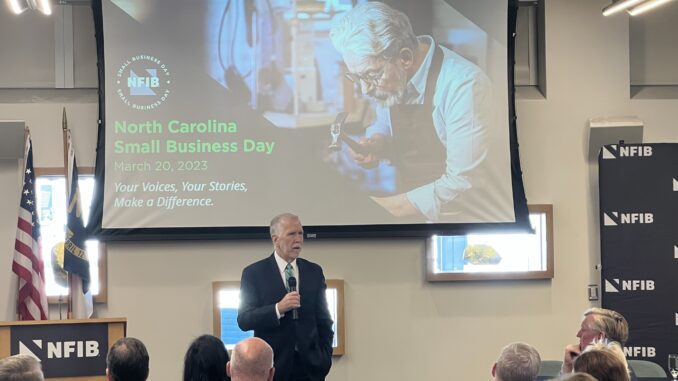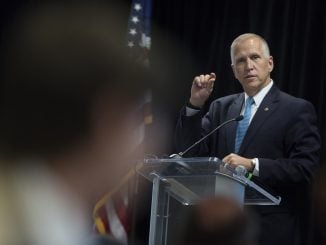
RALEIGH — Sen. Thom Tillis (R-NC) headlined an event for small business leaders across North Carolina on Monday in downtown Raleigh — a stone’s throw away from the General Assembly, where he helped usher in multitudes of changes in taxes, laws and more.
Making consequential change is also his goal in his second term as senator. That, though, has been more difficult.
Still, Tillis said during his remarks to North Carolina’s National Federation of Independent Businesses chapter he stands by every piece of bipartisan legislation he worked on in the past two years.
“I was involved in several bipartisan efforts in the last Congress,” Tillis said during the luncheon. “And I stand by every single one of them. I believe that they’re aging well. This is actually a time for people who are serious about governing to check some of their politics at the door and get something done.”
At the outset of his speech, Tillis told the crowd to scattered laughs you’d have to be “in the outer reaches of Mongolia” not to know about the Silicon Valley Bank failure. Tillis said forcefully it was not a major systemic threat to the banking system.
Tillis sits on the Senate Banking Committee, and the fallout — and future — of the industry will be a major part of the last four years of his second term.
While saying it was not a systemic threat, he added that “there are some brushfires out there we have to work on.” But he mostly blamed the ineffectiveness of regulations keeping up with the industry. He stated that the bank long dealt with liquidity problems and a “very risky portfolio” that came home to roost.
Tillis continued, tying the regulatory environment to the small business leaders in the room.
“We’ve got this mentality right now that, in my opinion, regulation benefits the biggest businesses,” he said. “What we need to do is start tailoring regulations across the spectrum to understand the disproportionate impact that it has on small businesses.”
Going back to his time as speaker, Tillis said regulatory reform was one of his priorities because reducing those burdens helps small businesses save costs the same way reducing taxes does. He said he is glad the legislature continues to rethink regulations.
Pivoting back to the national economy, Tillis said he believed the United States is currently in a recession and the effects will become better appreciated in the next six to nine months.
“I think the situation’s going to get worse before it gets better. I think we’re likely to weather the banking storm, but there are a lot of fundamentals with this economy that are just not working,” said Tillis. “A negative policy towards anything but green energy sector is dangerous. A policy that’s only about hydrocarbons is also dangerous. Coming up with a balance that makes sense is what we have to work on. Right now it’s going to be tough to do at the federal level.”
Tillis’ other main committees, Judiciary and Finance, show how many different areas of the economy intersect with Washington. He said his work in Senate Finance will be largely driven by international tax and trade. He is the ranking member of the Social Security subcommittee, something he says needs a “serious discussion,” adding that those at either end of the spectrum are against even having the discussion. Tillis said the only reason he’s on Judiciary is because of the Intellectual Property subcommittee, saying “it does great work” since being stood up six years ago.
He addressed concerns of the small business leaders about the impending expiration of tax expenders that were part of the Tax Cuts and Jobs Act passed in 2017. Tillis favors continuing to extend them or making them permanent, particularly pass through income provisions — something nearly 95% of small business owners utilize.
“It’s not a particularly ripe environment in D.C. to talk about reducing taxes. We have to make sure that we don’t lose ground there,” Tillis said. “We’re not going to see any sort of bipartisan support or tax reductions, but back on the regulatory front, that’s where we can take costs out of doing business. There’s not going to be much in the way of tax relief in a Biden administration.”
Taking on one of the major points of contention with Republicans both in state and in Washington, Tillis reiterated his support for bipartisan legislation to implement some form of a guest worker/guest visa program paired with returning to Trump-era border policies.
Responding to questions about the ongoing labor shortage and need for seasonal workers, Tillis told the crowd the two are intrinsically linked.
“I’ve been working with senators in a framework for the last year,” he said. “We’re continuing to spend a little bit more time talking with our House colleagues. The best way for us to get to a reasonable outcome for labor and immigration is for everybody who has a concern with labor and immigration to fully understand the unsustainable situation in the border.”
Continuing on the point, he added, “I’ve told this to the Business Roundtable, the U.S. Chamber of Commerce, the, you pick the long list of people that get the worker shortage thing. I said, I know you got it, I got it. I’ve been living it for 20 years now. Get reasonable border security and say that that is as important to you as your worker shortage.”
He also addressed what he called “border security deniers” who he says believe there’s no issue. Tillis said matter-of-factly he sees a dead person every time he goes on a border tour. He said he doesn’t know if they were killed by cartels or if they got into bad circumstances, but it’s a threat to the people making the dangerous trip.
“Now we’re losing about 70,000 people a year through fentanyl overdoses,” he said. “The vast majority of it is coming across the border. And what’s worse is the vast majority of that is coming through a legal port of entry because we can’t, with the technology and personnel, possibly scan more than maybe 15%, 20% of every truck or car that comes through.”
He added that getting the illegal crossings number down to 500,000 is manageable, but the mindset must be to get serious about border security to have a discussion about guest worker programs and guest visas.
Tillis makes no apologies for how he approaches the job.
“I’m in Washington trying to find reasonable policy to implement every day,” he said. “If it pushes some of my colleagues and my party out of the comfort zone, then don’t vote for it. But if we have enough to get it done, it’s time to get it done. You can’t wait for the next election. You can’t wait for the ideal circumstance of having control over all the bodies to get something done. You can’t wait for perfect. You need to get good done.”



